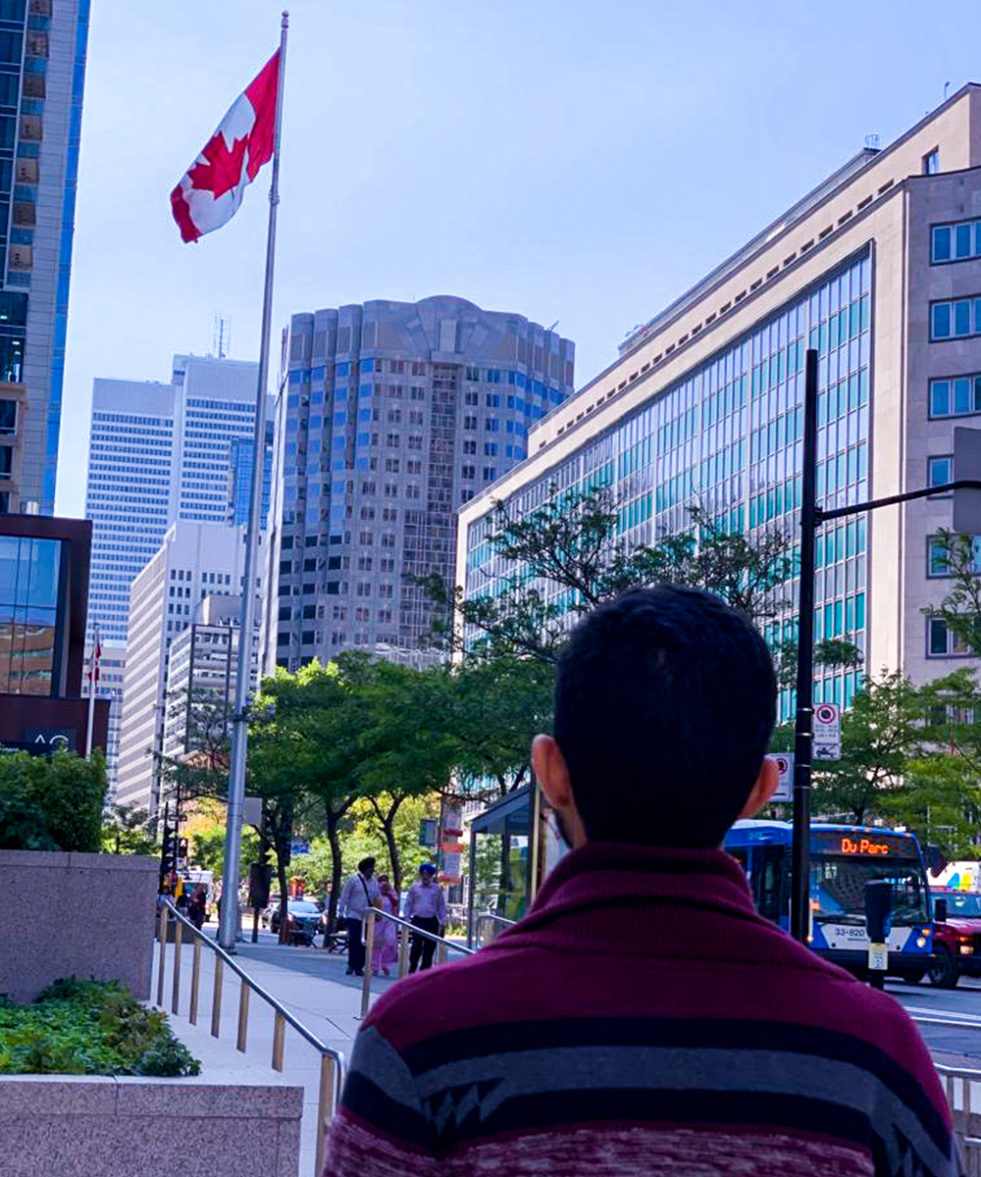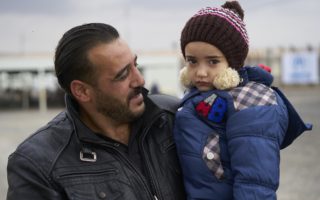
Mohammed gazes up at the Canadian flag in downtown Montreal. © Photo from Mohammed’s friend, Haitham
Mohammed arrived in Québec through Roxham Road, fleeing the world’s worst humanitarian disaster.
By Emmanuelle Paciullo in Montreal, Canada
“I was welcomed in Canada with much respect and dignity. I felt a strong emotion, a mixture of fear and relief – unsure what lay ahead of me, but with a glimmer of hope knowing that peace was possible again.”
Mohammed is one of the 2 million Yemenis who had to leave their homes because of the significant upsurge in violence in the country. He is now one of the 10,300 asylum-seekers who entered Canada irregularly between January and August 2019.
“It was during the winter of 2019, at dawn. I crossed the Canadian border by foot to claim asylum. Alone. I was scared.”
“For my own safety, I had to leave everything behind overnight, and flee in the hope that the situation in my country eventually gets better.”
Mohammed decided to seek asylum in Canada, known for its welcoming tradition, and find support within the Yemeni community in Quebec.
But his story begins in Yemen, the country he was forced to hastily abandon after being captured, beaten and released by armed groups.
Since 2015, the conflict opposing the Yemeni government and Houthi forces – allied to supporters of Yemen’s former president – seriously aggravated the humanitarian situation following years of poverty and insecurity in one of the Middle East’s poorest countries. An estimated 24 million people, or 80% of the population, require some form of humanitarian assistance to survive.
“I will never forget these days spent in the dark, somewhere underground, beaten simply because I had refused to work for violent armed groups,” Mohammed explained.
Widespread violence continued to the point where his family encouraged him to flee the country. That night, his life changed dramatically. Sitting on the passenger seat, a family neighbour accepted to drive him to the airport of a neighbouring city so that he could, out of sight, take the first flight to one of those rare countries that do not require a visa for Yemenis.
“For my own safety, I had to leave everything behind overnight, and flee in the hope that the situation in my country eventually gets better.”
After finding refuge in Southeast Asia, Mohammed obtained a temporary visa to study in the United States. But since he could not obtain a permanent residency, and without the possibility of returning to Yemen where the conflict had intensified, he was left with nooption. He heard about the possibility to claim asylum in Canada. In his search for details about such requests on the Internet, he found that under the terms of the Safe Third Country Agreement, the only possibility for him was to follow Roxham Road to seek asylum – which he did reluctantly.
“I remember the Canadian border official on Roxham Road saying: ‘If you cross this line, you will be under arrest.’ I was scared, alone, exhausted. I told them to arrest me. I told them that I had come to seek asylum in Canada.”
Mohammed formulated his asylum claim in proper and due form, and then the wait began – until the day he was summoned to his hearing in May 2019. He still remembers those agonizing fifteen minutes before the jury’s decision on the merit of his asylum claim.
“My life could now go on and start again where it was left off some five years ago.”
“Those were the longest fifteen minutes of my life. Time stopped. Everything was going to be decided at that very moment. You think about all the suffering you went through, all the reasons that led you to stand before the judge. You still feel the painful memories of your house trembling under the bombs. It’s an unexplainable kind of anguish – knowing that your freedom and survival depend on a single person. And then the decision fell. I was accepted as a refugee. I was speechless, shaken by the realization of what this meant: My life could now go on and start again where it was left off some five years ago.”
Since then, Mohammed has been working at the accommodation centre where he spent his first days in Canada, and he is pleased to help other asylum-seekers who stay here temporarily.
Under Canadian and international law, it is not a punishable offence to cross a border without authorization if this is to seek asylum. Due to the circumstances they are fleeing, asylum seekers are often compelled to enter a territory without the required travel documents or authorizations.



